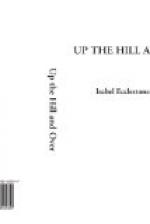But it was a long time before she found the strength to pick it up. When she did, she read it quietly to the end with its scrawled “H.” Then she read it over again, word by word. Her expression was one of terror and amaze.
When she had finished she looked up, over the pleasant garden, with blank eyes. Her face was ashen.
“He came,” she said aloud. “He came! But—what did she tell him when he came?”
The garden had no answer to the question. Somewhere could be heard a girl’s laugh and the sharp bark of a protesting puppy. Mary Coombe drew her hand across her eyes as if to clear them of film and, trying to rise, slipped down beside the elm-tree seat, a soft blot of whiteness on the green.
They found her there when they had finished washing the puppy, but though she came quickly to herself under their eager ministrations, she would not tell them what had caused her sudden illness. To all their questionings she answered pettishly, “Nothing! Nothing but the heat.”
CHAPTER XXI
When a man of thirty-five has at last shaken himself free from the burden of an unhappy love affair, he is not particularly disposed to welcome an emotional reawakening. He knows the pains and penalties too well; the fire of Spring, he has learned, can burn as well as brighten. Callandar thought that he had done with love, and a growing suspicion that love had not done with him brought little less than panic. Upon the occasion of Willits’ second visit he had begun to realise his danger and the professor never guessed how nearly he had persuaded him to leave Coombe. Some deep instinct was urging flight, but the impulse had come just a little bit too late. He could not go, because he wanted so very much to stay.
After Willits’ departure he had deliberately tested himself. For five days he did not try to see Esther and upon the sixth he realised finally that seeing Esther was the only thing that mattered. Then had come the short interview under the elm tree—an interview which had shown him a new Esther, demure, adorable, with eyes which refused to look at him. He had come away from that meeting with a new pulse beating in his heart.
To doubt was no longer possible. He loved her.
But she? Lovers are proverbially modest, but their modesty is fear disguised. They hope so much that they fear to hope at all; it seemed impossible to Callandar that Esther should not love him and yet it seemed impossible that she should. Only one thing emerged clearly from the chaos—the immediate necessity of finding out.
“Why don’t you ask her?” demanded Common Sense in that wearily patient way with which Common Sense meets the vagaries of lovers.
“But it is so soon,” objected Caution, while Fear, aroused, whispered, “Be careful. Give her time.” Even Mrs. Grundy made herself heard with her usual references to what people, represented by Mrs. Sykes, might say, adding scornfully, “Why, you haven’t met the girl’s mother yet. Don’t make a fool of yourself, please.”




